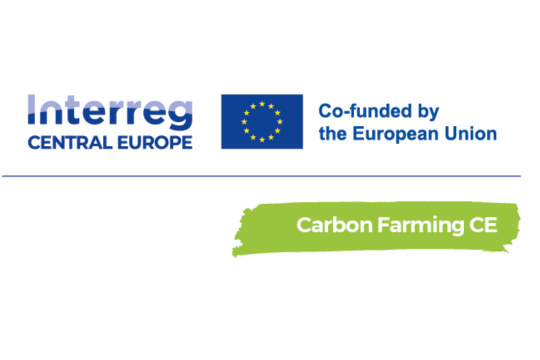The marvellous city of Bled in Slovenia hosted the kick-off meeting of the Carbon Farming CE project on 14 April 2023. Representatives of eleven consortium partners coming from nine countries have successfully launched this ambitious INTERREG CENTRAL EUROPE project that aims at bringing carbon farming on the fast-track to development, with a total funding of 1,8 million EUR from the European Regional Development Fund.
But what exactly is carbon farming? Dr Antoaneta G. Kuhar, the project lead at the Agricultural Institute of Slovenia explains: “The idea behind carbon farming is quite simple: Remove excess carbon from the atmosphere and store it in soil, where it will facilitate plant growth. In this way, carbon farming not only contributes to reducing GHG emissions, but it preserves and restores soil health through the increase of soil organic matter thus contributing to enhanced food production, resilience, security and biodiversity.”
Thus, it is no surprise that carbon farming is high on the international policy agenda, the Carbon Farming Initiative was officially presented by the European Commission at the end of 2021. However, the concept is novel, therefore techniques, business models and policies still need to be designed and tested. This is exactly where the Carbon Farming CE project will make an important contribution within the next three years.
The partners will elaborate and test six different carbon farming techniques and five business models in all participating countries and beyond, facilitating uptake and upscaling through the Carbon Farming Techniques Guide, the Carbon Farming Business Model Procedures and carbon sequestration monitoring roadmaps. The Central European Carbon Farming Cluster will accelerate policy recognition, using the strategy and action plan also developed under the project. Capacity building activities such as a three-day winter school and transnational seminars will complement the project’s portfolio of outputs and provide broad impact in terms of better understanding of the benefits of carbon farming by different stakeholders, wider acceptance of carbon farming practices and business models, and newly developed monitoring models. The project will also prepare decision makers for the participatory dialogue between different stakeholders when it comes to decisions on supporting measures within Common Agricultural Policy 2023-2027.
Check out our project website for further information and follow us on Facebook and Twitter.

